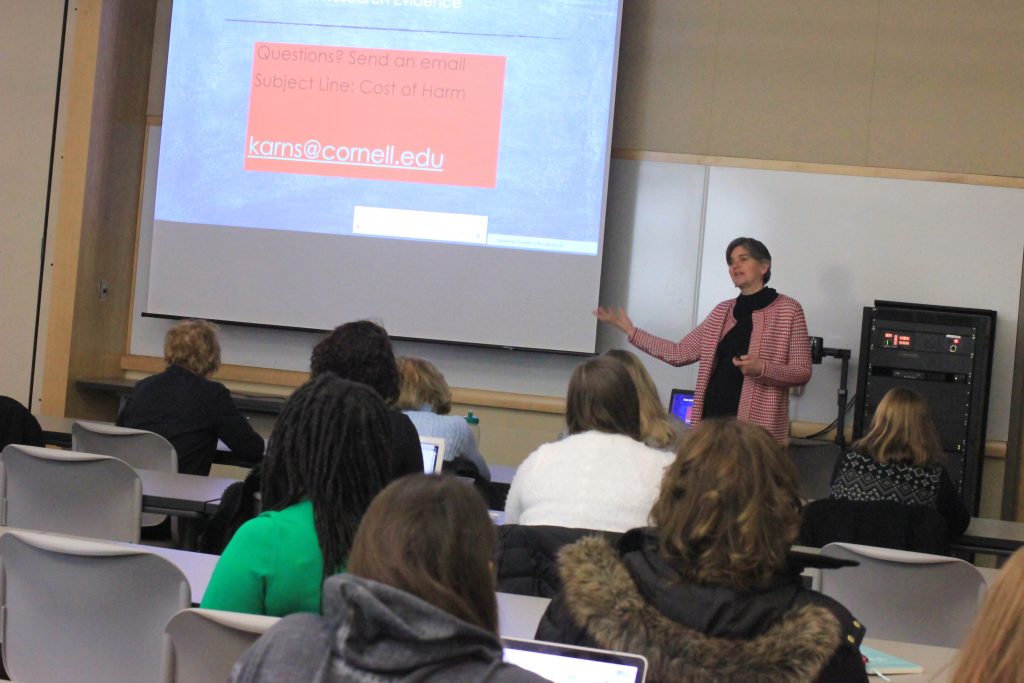
On Friday afternoon, Elizabeth Karns, a senior lecturer in the School of Industrial and Labor Relations at Cornell University, spoke about an aspect of sexual assault that often goes unnoticed by explaining the way in which sexual assault victims are more likely to experience a wage gap compared to nonvictims.
Karns also holds a master’s in public health in epidemiology and a juris doctor degree centered around the field of sexual assault. She explained to a group of 40 at the University Downtown Center that on average, one in five women and one in 16 men are sexually assaulted during their college years, yet only 2 percent of people who get assaulted report it.
“The vast underreporting is surprising,” Karns said. “[Reporting sexual assault] matters because it helps people to get on the path of their recovery. Victims should be able to process this, and one of the methods that may initiate their recovery is reporting the incident so that they may receive the proper help and treatment.”
Karns explained that money is not something people usually focus on in the aftermath of a sexual assault, yet costs for a victim begin almost immediately. These may include tests for sexually transmitted diseases, a rape evidence kit and clothing replacement. Furthermore, she noted that a long-term concern for sexual assault victims is their likelihood to veer off their educational path, which she quantified through the monetary cost victims lose out on throughout the course of their lives.
“Some victims may drop a course to ease the stress of their life after an assault, which may result in the loss of their financial aid, as one may no longer be considered a full-time student,” Karns said. “Others may transfer schools, usually to those which are easier which may further limit their potential. In the long run, victims are six times more likely to have episodes of post-traumatic stress disorder in their lifetime than others. They are more prone to use hard drugs, twice as likely to be a smoker and exhaust 20 percent more insurance use compared to nonvictims.”
These limiting factors, Karns noted, all contribute to a wage gap and perpetuate a string of losses for the victim. The losses are characterized not only by the mental stresses and the immediate monetary costs of the assault, but also the thousands, if not millions of dollars the victims may lose if the assault caused them to fall from their educational path and deal with additional issues in the workforce.
Karns explained that in order to remedy the wage gap, certain actions must be taken to keep students on their educational paths after an instance of sexual assault. This may be done, she explained, by allowing the student to sustain a period of lowered stress. One such method suggested is to allow for the temporary release or deferment from the burden of student loans, an idea that has not so far succeeded, but Karns encouraged contacting local representatives about the matter.
Haley Murphy, a Binghamton University alumna who graduated in 2014 with a master’s in student affairs and administration and currently works as the campus sexual assault liaison at Crime Victims Assistance Center, an organization that looks to support and educate the community’s ability to prevent and respond to victims of crime, explained how the event may have an impact on the way sexual assault can be perceived and responded to.
“I’ve never seen this information put out this way before,” Murphy said. “It’s a completely different take on it, and it can get people to have a new perspective of it. Money speaks and this may garner more attention to sexual assault and the consequences of that. Sexual assault is an underreported issue which happens often, so hopefully Karns’ analysis and unique perspective on it can help get more attention around it.”


